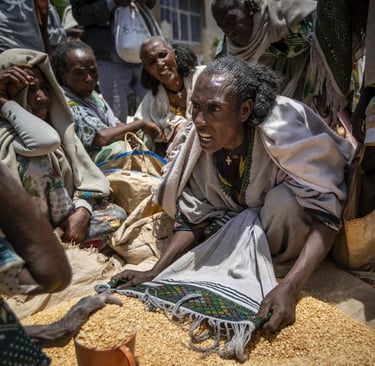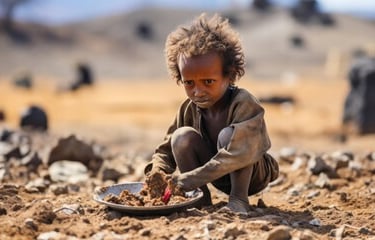One of The Five Churches In Crisis in this book we will preview Ethiopia
From Prophecy to the Kingdom of Aksum and Its Modern Challenges Ethiopia has long held a profound spiritual significance, deeply interwoven with the biblical narrative. Its role in God's plan is evident from the earliest scriptures—through Moses’ marriage to a Cushite woman (Numbers 12:1) and the conversion of the Ethiopian eunuch in Acts 8:26-39 .................................................
“Cush Will Fall by the Sword” – Ezekiel’s
Warning to Ethiopia and Book of Judges When we think of “judges” in the Bible, it’s easy to imagine courtroom officials with gavels and robes—but in reality, the judges of ancient Israel were regional, tribal leaders. They were military commanders, and political figures raised up by God to deliver the people in times of crisis. Yet even though they were chosen for such high purposes, their stories are a sobering reminder of what happens when a nation—or a church—forgets its covenant with God. The book of Judges is not a light read. It’s disturbing, violent, and tragic. It does not sugarcoat the reality of Israel's moral decline and its slide into corruption and chaos. Instead, it exposes the consequences of a people who abandoned justice, rejected godly leadership, and lived according to the motto: “Everyone did what was right in their own eyes” (Judges 21:25).As Israel drifted further from God, its leaders became increasingly compromised. The early judges like Othniel and Deborah displayed some measure of faithfulness, but as time went on, the character of the leaders eroded. Gideon, though victorious, eventually led Israel into idolatry. Jephthah sacrificed his own daughter due to a reckless vow. Samson, driven by lust and revenge, became a tragic figure whose strength far outweighed his wisdom. This whole cycle of God freeing them using Judge when people repent, then they go back to the same injustice then god hands them to oppression they repent God send other judge and the cycle continue but israel morel went so low it led to its first civil war filled with sexual violence and eleven tribe almost wiping tribe of Benjamin The enduring tragedy of Ethiopia is deeply intertwined with the persistent primacy of tribal and ethnic allegiances, often overshadowing and undermining a unifying commitment to the core tenets of Christian faith. This dynamic tragically mirrors the cyclical patterns of disobedience, oppression, and fleeting deliverance chronicled in the Book of Judges. Just as ancient Israel repeatedly strayed from their covenant with God, placing their trust in transient tribal leaders and local strongmen rather than the steadfast and ultimate deliverance offered by the Divine, so too has Ethiopia seemingly been ensnared in a recurring pattern of internal strife fueled by deeply ingrained ethnic loyalties. This reliance on ethnic champions as perceived saviors, rather than a collective national identity firmly rooted in the shared brotherhood and sisterhood of Christian faith – a faith that proclaims "There is neither Jew nor Gentile, neither slave nor free, nor is there male and female, for you are all one in Christ Jesus" (Galatians 3:28, NIV) – has repeatedly plunged the nation into periods of profound instability and devastating violence. horrific conflict against the Tigray region serves as a stark and heartbreaking contemporary parallel to the internecine warfare vividly depicted in the Book of Judges, including the deeply disturbing echoes of sexual violence used as a weapon of war, and the immeasurable cost in human lives and shattered communities. The lamentable and profoundly un-Christian aspect of this recent conflict is the documented involvement of members of the Ethiopian Orthodox Tewahedo Church on opposing sides of the conflict, engaging in violence against those who share their baptism and their foundational religious identity. According to the 2007 Ethiopian census, approximately 96% of the population of Tigray identify as Christian, with the vast majority of those being Orthodox. This tragic reality represents a profound failure, echoes the haunting words of Cain, who after murdering his brother Abel, asked God, “Am I my brother’s keeper?” (Genesis 4:9, NIV). Cain speaks to Abel, and then kills his brother while they are in the field. This is the first recorded act of murder in the Bible.God then confronts Cain, asking, 76 "Where is your brother Abel?" Cain's response, "I don't know. Am I my brother's keeper?" reveals his denial and lack of remorse.God replies, "What have you done? Listen! Your brother's blood cries out to me from the ground." This verse emphasizes the severity of Cain's sin. God hears the cry of Abel's blood, signifying that murder is a grave offense. This prioritization of ethnic identity over the unifying and peace-seeking principles of their shared faith mirrors the spiritual and societal breakdown witnessed in ancient Israel, where "everyone did what was right in their own eyes" (Judges 17:6, NIV), leading to chaos and bloodshed. Ethiopia was once a nation that stretched out its hands to God—not only in worship, but in action. It sheltered the persecuted, honored the sacred bond of Christian brotherhood, and stood as a prophetic light in a darkened world. From King Armah’s righteous stand to protect Muslim refugees, to King Ezana’s bold declaration of Christianity as a state faith long before Rome, Ethiopia lived out the divine mandate to speak up for the voiceless and to love the foreigner as oneself. But how far we have fallen. Today, the same land that once welcomed strangers in the name of justice has become a land where brothers shed each other’s blood. The same Christian identity that once united a kingdom now divides it—fractured by tribalism, politics, and power. Even more grievously, bishops and priests—called to be peacemakers and shepherds—now bless tanks and weapons, praying over instruments of war rather than interceding for peace. Instead of calling nations to repentance, they call for retaliation. Instead of mourning the bloodshed of fellow believers, they are fueling it with religious zeal, waving incense over engines of death. What gospel are we preaching when the cross is placed beside a cannon? What witness do we bear when pulpits justify war rather than comfort the broken? Churches that once offered sanctuary now stand silent while baptized believers kill one another. The nation that once rose to defend dignity has descended into cycles of ethnic violence and moral amnesia, forgetting the call to be its brother’s keeper. How did we get here? Where is the Ethiopia that once declared Christ as Lord not only with its lips, but with its laws, its mercy, and its courage? This is not just a national crisis—it is a spiritual one. And unless we repent and return to the covenant of justice, mercy, and humility before God, the blood of our brothers will continue to cry out from the ground, and the flame that once lit the horn of Africa flickers into darkness...........................continues





